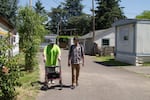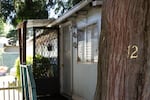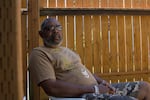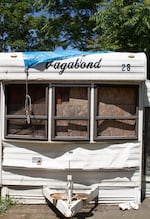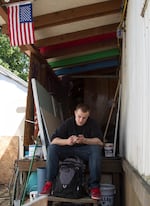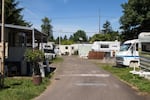
The trailers at Oak Leaf are showing their age, and a handful have been abandoned.
Amelia Templeton / OPB
If you drive by the Oak Leaf mobile home park on Killingsworth, you might not even realize it's there.
A hedge shields the park from the busy street. There's a sign posted next to it: No vacancies. Oak Leaf rarely has open spots. Homes here rent for less than $500 dollars a month. They get snapped up fast.
Rhonda Polk moved in a couple months ago. She's fixing up a trailer in a quiet spot in the back of the park.
"I'm going to be painting all this stuff, putting in the final touches. I'm (going to) be wallpapering in here," she says, pointing out the bedroom.
Her trailer is worn. It looks like it was built in the 1970s. But there’s a new carpet, and Polk and her sons have painted the walls lavender.
Polk's sons are 13 and 14 years old. She's raising them by herself.
"Most of their life has been kind of unstable because we can't keep a place," she says.
For a year, the family was homeless. The manager at Oak Leaf was willing to overlook Polk's bad credit and the eviction on her record.
"We can be together. If we just want to sit in here all day and watch movies, we can do that and not worry about where we're going to go tonight or how we're going to pay for this," Polk says. "It may not look like the best place to be, but it's ours."

Oak Leaf was willing to overlook Rhonda Polk's bad credit and eviction record. "I have a few people here who I would consider closer than family," she says. "My image of a trailer park has really changed."
Amelia Templeton / OPB
Oak Leaf has its share of problems. Vacant trailers. Stray cats. Sewer lines that back up.
But in a city with some of the country's fastest rising rents, it's been a stable home for people who can't afford to live anywhere else. Mobile home parks are perhaps the largest privately provided source of affordable housing in the state.
"Parks tend to be either starter families, who can't afford a single family home, a lot of farmworkers and a lot of seniors," says John VanLandingham, a legal aid attorney who works with manufactured housing tenants. "They tend to be communities."
They're also vulnerable to development and gentrification.
“Parks tend to be targets for redevelopment. They’re flat, large. A lot of them were built on the fringes of communities in the 80s and 90s, and those communities have expanded out to them now," he says.
Oak Leaf is owned by a woman in California. The 60 residents recently learned she was planning to sell it to a developer.
"All of us here would be without a place," says Victor Johanson. He's a friendly guy, 57 years old, with glasses and a thick beard. His trailer is robin's egg blue, with a wheelchair ramp neighbors built for him.
Johanson owns his trailer, but pays rent every month for the space it's parked on: $460 a month. He looked into having his home towed somewhere else. It's still got a license plate. But it was built in 1968, and he was told it wouldn't survive a move.

Resident Victor Johanson has helped lead the effort to save the park. "What we're trying to fight for is, there needs to be legitimate low-income housing for people," he says.
Amelia Templeton / OPB
“If you tried to pull this out and move it, everything would fall apart,” he says. "I mean, the walls would fall apart."
He's also looked for an apartment to rent on Craigslist.
"And what I see there is people saying that reasonable rent is like, $1,000 or something," he says.
That would take almost his entire monthly disability payment, which totals $1,005. Johanson used to work as a file clerk at a law firm, but diabetes and a bone disease make it hard for him to get around. That’s all he has to live on. It's just enough to cover the rent, utilities and a few essentials.
So Johanson and the other residents asked for help. They started working with Living Cully, a neighborhood coalition of four nonprofits, and with the housing non-profit CASA.
They learned that Oregon law requires manufactured home park owners to notify the residents if they plan to sell and to give them a chance to make a competitive offer.
“We’re trying to do it where we can all live here as a cooperative to where we can all look after each other and take care of each-other,” Johanson said.
Oregon has a series of laws that protect the rights of manufactured home owners, though those laws provide little or no protection for people who rent their trailers as well as the land.
Tenants in a park that is being bought must be given an opportunity to purchase the land instead. Landlords must provide a year's notice and sometimes must pay up to $9,000 to help manufactured home owners relocate if their park is closed.

Renae Corbett lives at Oak Leaf with her 80-year-old father and two dogs. "It works for me. The price is right," she says.
Amelia Templeton / OPB
VanLandingham says the legislature became concerned after dozens of parks closed during the last housing bubble in 2005.
About a dozen other manufactured home parks in Oregon have formed co-ops and bought their land. Oak Leaf would be the first in Portland.
By forming a cooperative, the park's residents could qualify, with CASA's help, for a loan of about $400,000. In the future, their rent checks would go to paying back that loan.
But that still would leave them about $1. 5 million short of what they need to buy the park and bring it up to code.
"We want to be helpful and would be interested in trying to help finance the deal," says
Portland Commissioner Dan Saltzman, who runs the city's Housing Bureau.
Saltzman says a tax he's proposed on new construction could help the residents purchase their park.
$1.5 million for a plot of land and 30 aging mobile homes is a lot of money. But it works out to about half what the city pays per unit to build new affordable housing, Saltzman said.
Last week, Oak Leaf’s owner said she would accept the resident’s offer to purchase the land if the residents are able to finance the deal.
Saltzman says he's learned of at least four other mobile home parks in the city could be sold off soon. Oak Leaf might offer a model for how to preserve them, too, he says.
“They are affordable housing that often is not considered in the mix of our conversations," he says. "But we need to consider them as well.”

